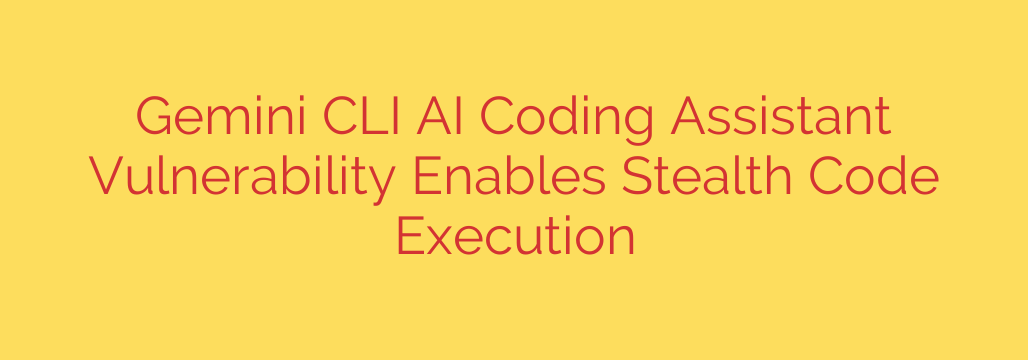
Critical Gemini CLI Flaw Exposed: How AI Assistants Can Secretly Execute Malicious Code
AI-powered coding assistants are rapidly becoming indispensable tools for developers, promising to accelerate workflows and debug complex problems. However, a recently discovered vulnerability in Google’s Gemini command-line interface (CLI) serves as a stark reminder of the new security risks these powerful tools can introduce. A critical flaw was identified that could allow an attacker to achieve stealthy, remote code execution (RCE) on a developer’s machine, turning a helpful assistant into a potential backdoor.
This vulnerability highlights a growing concern in the software development world: as we integrate AI more deeply into our toolchains, we also create new and sophisticated attack vectors that can be difficult to detect.
How the Stealth Attack Works
The attack vector is both simple and insidious. It preys on the common developer practice of copying code snippets from the internet—whether from documentation, forums like Stack Overflow, or public repositories on GitHub—and using an AI assistant to understand or refactor them.
The vulnerability was triggered when a developer used the Gemini CLI to process a specially crafted, malicious code block. Here’s the breakdown of the attack chain:
- The Bait: An attacker creates and shares a piece of code that appears harmless but contains a hidden, malicious payload. This could be disguised as a solution to a common programming problem.
- The Trigger: A developer copies this malicious code and uses a vulnerable version of the Gemini CLI to “explain” or analyze it.
- The Execution: Instead of simply analyzing the text, the flaw in the Gemini CLI caused it to misinterpret and execute a part of the malicious code. This happens silently in the background, without any warning or indication to the developer that their machine has been compromised.
This type of exploit is particularly dangerous because it occurs within a trusted environment. The developer isn’t downloading and running a suspicious executable; they are using a legitimate tool from a major tech company. This trust is what makes the attack so effective.
The Broader Risks: Why This Vulnerability Matters
While this specific flaw in the Gemini CLI has been addressed, it exposes a fundamental risk associated with AI-driven development tools. The core danger lies in the potential for these tools to bridge the gap between untrusted external content and the developer’s high-privilege local environment.
A compromised developer machine is a goldmine for attackers. It can provide access to:
- Proprietary source code and intellectual property.
- API keys, passwords, and other sensitive credentials.
- Internal corporate networks and cloud infrastructure.
- An opportunity to inject malicious code into a company’s software, leading to a devastating supply chain attack.
The silent nature of the execution means a breach could go unnoticed for weeks or months, giving attackers ample time to escalate their privileges, exfiltrate data, and establish a persistent presence within a network.
Actionable Security Tips for Developers and Teams
The emergence of such vulnerabilities doesn’t mean you should abandon AI assistants. Instead, it calls for a more security-conscious approach to using them. Here are essential steps every developer and organization should take:
- Update Your Tools Immediately: The most critical first step is to ensure your Gemini CLI and other development tools are always running the latest version. Vendors regularly release patches for security flaws, and staying updated is your first line of defense.
- Scrutinize All External Code: Treat any code copied from the internet with suspicion. Before feeding it into an AI assistant or running it locally, take a moment to review it for strange commands, obfuscated text, or unusual formatting.
- Embrace the Principle of Least Privilege: Avoid running development tools, including CLIs, with administrative or root privileges unless absolutely necessary. Running tools with lower permissions can limit the potential damage an attacker can inflict if a tool is compromised.
- Isolate Untrusted Processes: Consider using containerization technologies like Docker or virtual machines to analyze or run untrusted code in an isolated environment. This sandboxing prevents a potential exploit from affecting your primary operating system and data.
- Foster a Security-First Mindset: Security is a shared responsibility. Teams should regularly discuss emerging threats and reinforce best practices for handling external code and using third-party tools safely.
As AI continues to transform software development, vigilance is key. These powerful assistants offer incredible benefits, but we must remain aware that they also represent a new frontier for security threats. By staying informed, keeping tools updated, and practicing robust security hygiene, developers can harness the power of AI without exposing themselves—or their organizations—to unnecessary risk.
Source: https://www.bleepingcomputer.com/news/security/flaw-in-gemini-cli-ai-coding-assistant-allowed-stealthy-code-execution/








